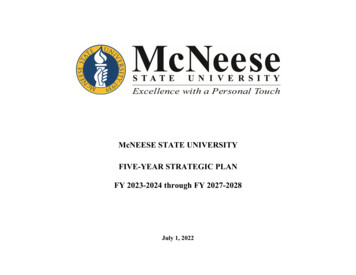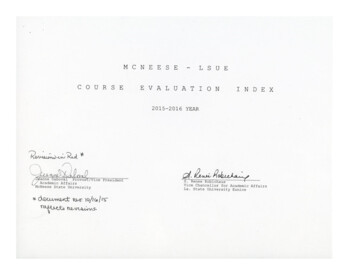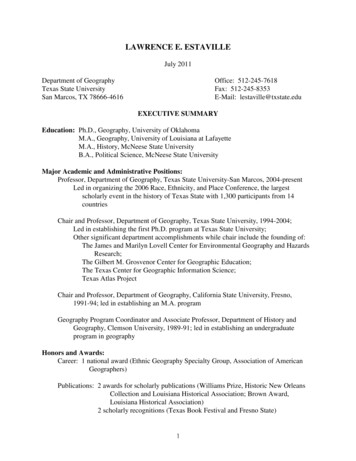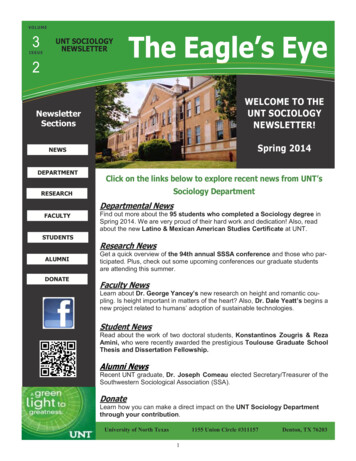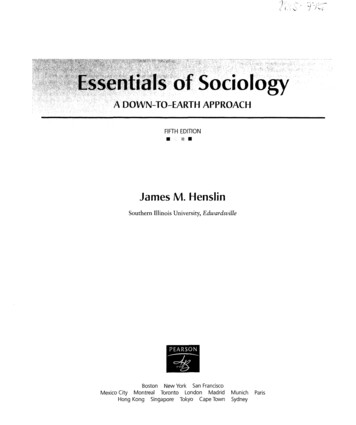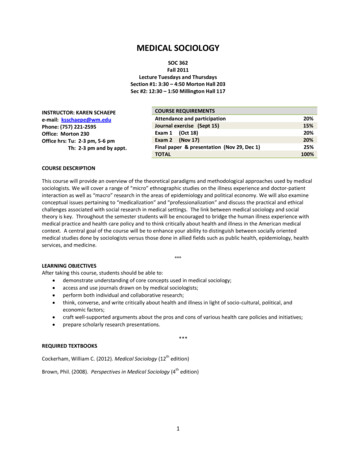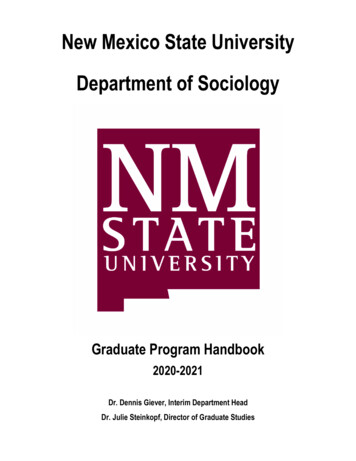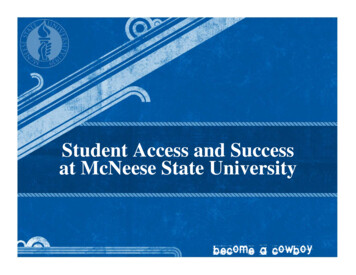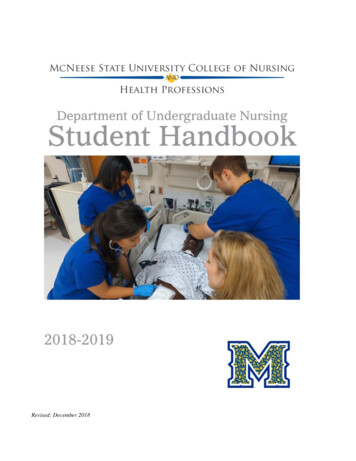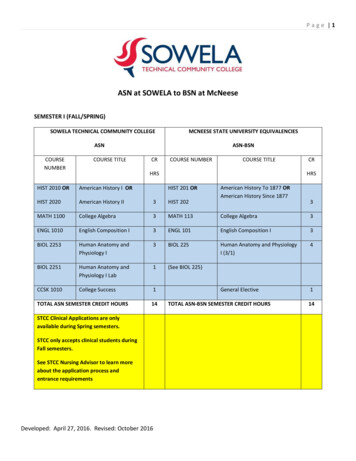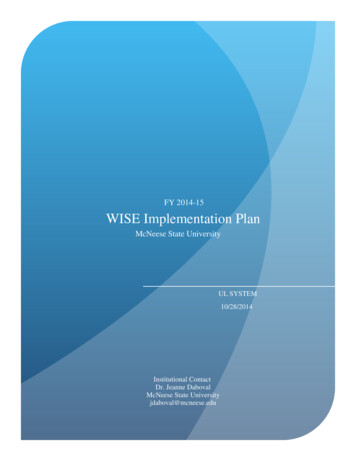![Sociology [SOCL] - McNeese State University](/img/54/sociology-2021.jpg)
Transcription
Sociology [SOCL]Cycles included in this report:Jun 1, 2020 to May 31, 2021This PDF document includes any files attached to fields in this report.To view the attachments you should view this file in Adobe Acrobat XI or higher, or another PDFviewer that supports viewing file attachments.The default PDF viewer for your device or web browser may not support viewing file attachmentsembedded in a PDF.If the attachments are in formats other than PDF you will need any necessary file viewers installed.
Xitracs Program ReportProgram Name: Sociology [SOCL]Reporting Cycle: Jun 1, 2020 to May 31, 20211 Is this program offered via Distance Learning?100% Traditional or less than 50% Distance/Traditional2 Is this program offered at an off-site location?No2.1 If yes to previous, provide addresses for each location where 50% or more of programcredits may be earned.There are no additional addresses.3 Example of Program Improvement2016-2017:The B.A. in Sociology offers concentrations in general sociology or family and child studies. Anincreasing pool of highly qualified visiting lectures have been developed to assist regular faculty inoffering a broad range of required and elective major courses.2017-2018:In an effort to improve the Sociology B.A. degree program within the Department of SocialSciences, a number of departmental Sociology professors met with IRE to improve theassessment items within this academic plan. By moving in this direction, the quality of ourassessments and student learning outcomes have been enhanced.2018-2019:There have been efforts to enhance the collected data for this report. SOCL211 faculty developeda pre/post test. It was tested as a post test in the spring of 2019. It is to be implemented as a pre/post test in the fall of 2019. Additionally, SOCL211 faculty are developing a comprehensivedepartmental final for SOCL211. It is anticipated that in 2019-2020 a pre/post test will bedeveloped for SOCL411. This may be more revealing than the current assessment that indicateda drop in scores that may have multiple explanations. SOCL320 scores increased from only69.53% earning 32 or more points out of a possible 40 points to 81.91% in the spring of 2019.2019-2020:There was obvious improvement from the pretest (average 56.6) to the post-test (average 79.2)for fall 2019. This is an improvement of 39.9%. There was even more improvement (44%) in thespring of 2020. This is a remarkable improvement over prior years. The post test prior to this yearwas usually around 69% with a pretest in the mid 50s. The class had been redesigned with moreemphases on theory.2020-2021:Overwhelmingly, the students' performances dropped during the fall of 2020. Virtually alwaysthere was consistence improvement during the spring 2021 assessments over the fall 2020. Thedrop can likely be related to both the students and faculty experiencing two major hurricanesduring the fall of 2020. It is extremely impressive that the performance improved significantly inone semester. This highlights the resilience of the McNeese family.4 Program Highlights from the Reporting Year2016-2017:Students continue to meet benchmarks. New program coordinator appointed for Family and ChildStudies.2017-2018:Program Coordinator for Family and Child Studies resigned around midterm of the spring 2018semester. Temporarily, a faculty member became Family and Child Studies Coordinator. All of theresigning teacher's classes were covered by adjuncts and a faculty member. His vacant positionPage 2 of 19
Xitracs Program Reportreplacement started in the fall of 2018. The Sociology Program has continued to have a largenumber of students. The students are served by dedicated adjunct and full time faculty.2018-2019:A new coordinator was appointed for the Family and Child Studies Program beginning the fall of2018. Both Sociology programs have continued to be programs with a large number of majors.During the spring of 2019, the Family and Child Studies program's name was updated to theFamily Science program.2019-2020:The General Sociology Program continues to have a large number of majors in both the traditionaland online versions. The recent reduction in overloads/adjuncts and the retirement of onesociology faculty member has resulted in courses being offered less often. Most courses havebeen offered on a rotational bases that met the students needs. The exception was Socl320.Ultimately, two sections of SOCL320 were taught in the summer of 2020. This has corrected theissue. The three sociology faculty are dedicated to serving the students and department.In the 2019-2020 Catalog, the Family and Child Studies Concentration was renamed into FamilyScience Concentration inline with the guidelines of the professional organization, the NationalCouncil on Family Relations (NCFR). No changes on the content of the concentration. Theapplication for NCFR's approval of the Family Science Program (FMSC) was prepared.Enrollment has become steady over 100 students each semester. For example, from 88 studentsin Fall 2018, the number of students grew up to 115 in Spring 2020. The schedule of FMSCclasses has been adjusted to offer FMSC courses on a rotation basis: every course to be taughtevery other semester. A critical sequence of FMSC 423 methodological courses preceding theCapstone course of FMSC 481 Internship are offered in the similar manner: FMSC 423 is in theFall, FMSC 481 is in the Spring. The Internship achieved a milestone of having 50 localorganizations used to place interns in accordance to their professional interests (i.e. working withchildren, adolescents, adoption/foster care, older adults, with those in later life, etc). Studentsreport feeling more connected to each other and to the FMSC because of the advanced use oftechnology in the classroom by FMSC faculty.2020-2021:The Sociology Program has General Sociology (online and face-to-face) and an online FamilyScience Concentration. Starting March 2020 all classes in Sociology have only been online. Thisis due to Covid and hurricanes. Eventually, face-to-face classes will resume.The General Sociology Program continues to have a large number of majors in both the traditionaland online versions. The sociology classes have continued to be taught less often. This startedwith the reduction in overloads/adjuncts and the recent retirement of one sociology facultymember. Most courses have been offered on a rotational bases that met the students' needs. Theexception has continued to be SOCL320. Ultimately, two sections of SOCL320 were taught in thesummer of 2020. This temporarily corrected the issue. This academic year only one section wastaught. It was online with sychronous meetings. This can be difficult for totally online students.The three sociology faculty are dedicated to serving the students and department.The discipline of Family Science is focused on strengthening families through education, research,service, and advocacy. The family science undergraduate students are preparing for careers ashelping professionals in many areas including family life education, case management, humanservice administration, social work, teaching, counseling, healthcare, and community advocacy.Graduates of the McNeese Family Science Program become Family Life Educators and areeligible for professional certification via the premier professional organization, the National Councilon Family Relations (NCFR).Professional Organization (NCFR) StandingThe National Council on Family Relations has completed the review of submitted documentationand about to grant (in May 2021) the approval of the program for the next 5 years.Enrollment2020-2021 enrollment totaled to 170 students who register FMSC courses:Page 3 of 19
Xitracs Program Report126 majors;44 minors;Many Psychology students without declaring FMSC as a minor still take FMSC courses thatprevent a reliable calculation of the exact number of minors;Additionally, Bachelor of General Studies, Concentration in Behavioral Sciences programstudents also take FMSC courses that ads an additional unmeasurable demand on theseats in FMSC courses.Schedule/CoursesThe FMSC class schedule was NOT a “fixed” one but floating, which meant classes were offeredbased on student’s surveys and previously offered history. The limitation was due to one full-timeand one part-time faculty. Courses’ sequences recommended for a change in the Catalog are:A “hard” prerequisites for FMSC 423 Family Life Education Methods & Practice (i.e.,enrollment to FMSC 423 must require):all 200-300 level FMSC courses (simultaneous completion not allowed);permission of the department head.A “hard” prerequisite for FMSC 481 Internship in Family Science isFMSC 423 course andpermission of the department head.InternshipFMSC internship program is designed to provide students with opportunities to explore theprofessional workplace in their professional area of interest while applying key concepts learnedthroughout their academic journey. The COVID-19 pandemic moved Internship online but not forall students.A milestone of 21 students enrolled in the 2021-S FMSC 481 Internship course was reached.Interns were placed with local, state, regional, and national(!) organizations in four statesincluding California, Louisiana, Missouri, and Texas; 65 organizations on record partner withMcNeese via Family Science Program. The 2021 partner organizations include (bolded are somenational and regional organizations): American Red Cross – Louisiana Region A.V.E.C. (Acadiana Visitation and Exchange Center) Les Enfants Camp Fire National Headquarters Care Help of Sulphur Castleman Creek Elementary DeWanna’s Closet Educational and Treatment Council Eight Million Stories Faith House Acadiana Finally Family Homes Harbor Hospice Literacy Council SWLA Louisiana Coalition Against Domestic Violence Make-A-Wish Texas Gulf Coast & Louisiana New Life Counseling Share Care USA St. Elizabeth Foundation United Way of Acadiana United Way SWLAStudents/EventsNon-traditional students constitute almost half (44%) of the student body. Since 2016, the FamilyScience Program provided internship for 112 interns; for the entire duration of the program 36%receive a full-time job offer (or if only the last two years are taken into account, then 50% do); 46%apply for graduate school.Page 4 of 19
Xitracs Program ReportPage 5 of 19On Saturday, April 24, 2021, the first of its kind 100% student-lead McNeese Family ScienceConference took place. It was a 3-hour divided in three 1-hour blocks with two or threethematically grouped sections with presentations by the current interns on the work they weredoing in their internship. A panel discussion of interns, including Q&A at the end completed theprogram. A full account of the event is available online here: Family Science Success Virtual 8nc1f0q)AlumniPotential for further development of the Family Science Program includes the work with alumni.Outgoing graduates (in an anonymous survey) state that they won’t forget “The helpfulprofessors,” “how helpful Mrs. White is,” “how high encouragement to keep going, even we aretired, can go a long way,” and “I feel like I am very prepared for life and my career afterparticipating in the Family Science Program.”5 Program MissionThe purposes of the Bachelor of Arts degree in sociology are:Students will broaden their knowledge and increase their understanding of humankind’spast and present social endeavors through an academic understanding of various societies,cultures, social theories, and social philosophies.Students will be provided with a solid liberal arts background and program of study leadingto a Bachelor of Arts degree in sociology which prepares them for careers and graduatelevel study in sociology and related areas. All students will be required to receive instructionin statistics, languages, theory, and various human/social sciences.To offer students the opportunity to obtain a minor in sociology and/or acquaint themselveswith sociology. The department offers a minor in sociology to all students.To serve the University, the academic community, and Southwest Louisiana throughteaching, research, community service and University service. Faculty are encouraged toengage in research and publication.6 Institutional Mission ReferenceThis degree supports the University’s fundamental mission to offer baccalaureate curricula inservice to the residents and employers of the SWLA region and beyond. It provides opportunitiesfor student internships in local industry and prepares students to become effective in academicand professional environments.7 Assessment and Benchmark SOCL 201 Pre-test & Post-testAssessment: SOCL 201 pre-test & post-test scores.Benchmark: 75% of students will correctly answer three of the five questions on the post-test, andthere will be a 75% increase in correct answers on the post-test over the pre-test.Prior to 2020-2021, the benchmark was 60% of students will correctly answer three of the fivequestions on the post-test, and there will be a 75% increase in correct answers on the post-testover the pre-test.Prior to 2019-2020, the benchmark was 60% of students will correctly answer three of the fivequestions.Outcome LinksTheories of Sociology [Program]Students will demonstrate a knowledge of theories of sociology.7.1 DataTerm# of students completingpreand post-testStudents meetingbenchmark#%Fall 201725217469.0%Spring 201820212963.8%Fall 201823316068.7%
Xitracs Program ReportPage 6 of 19Spring 2019Term143# of studentscompleting preand post-test82Students meetingbenchmark57.0%Average scores#%Pre-testPost-test% change frompre- to post-testFall 201921013263.0%1.56/52.7/573.0%Spring 202018712868.0%1.66/53.16/590.0%Fall 202017911162.0%1.77/53.16/578.0%Spring 202114310976.0%1.8/53.24/580.0%7.1.1 Analysis of Data and Plan for Continuous Improvement2016-2017:This is a new assessment. Data tracking will begin next year. A scoring rubric will be utilizedto establish the benchmark for this new assessment in SOCL 201 (pre-test/post-test).Strengths and weaknesses will be identified, and strategic decisions will be made as to whatsteps need to be taken to enhance the students’ knowledge of theories of sociology. Ananalysis of the pre-test/post-test scores will be conducted to help us assess whereimprovements can be made in this student learning outcome.2017-2018:The current benchmark was met during the fall 2017 and spring 2018 semesters. During thefall of 2017, 69% of the students met the benchmark. In the spring of 2018, 63.8% of thestudents met this benchmark. In this particular vein, there was a lower percent meeting thebenchmark in the spring 2018 semester. The plan for continuous improvement includes aprocess which will entail gathering some additional data for the SOCL 201 classes. By movingin this direction, it is anticipated that the future benchmark could be elevated to a higherpercent of students (70%) meeting the benchmark number of answering three out of fivequestions on the pre-test/post-test assessment.2018-2019:The benchmark was once again met for the fall of 2018. There was a higher percent meetingthe benchmark for the fall of 2018 than for the spring of 2019. The benchmark was not met forthe spring of 2019. Initially, this seems to be a setback. However, a closer scrutiny of the dataindicated that the pretest scores for the spring was exceedingly low. The average score for thespring 2019 pretest was only 1.86 out of a possible five. The pretest average for the fall of2018 was 2.63.The spring 2019 students appear to have entered the class with far less knowledge than thefall 2018 students. The fall 2018 students increased their post-test scores to an average of3.23 (an increase of 27.81%). The spring 2019 students increased their average post-testscores to 2.65 (an increase of 42.47%).The current plan for improvement includes continuing to use this assessment. There will alsobe an effort to explore if this difference in pretest from one semester to the next is an anomaly.The faculty will continue to strive to improve the students understanding of the material.2019-2020:During both semesters the current benchmark of 60% of the post test students correctlyanswering three of the five questions was met. The benchmark for improving in proficiencyfrom pretest to post test was 75%. This was not met in the fall 2019 since it was only 73%. Itwas greatly surpassed in the spring of 2020 at 90%.This assessment will continue to be used. The plan for improvement includes raising thebenchmark for proficiency on the post test of answering three of the five questions correctly to75%. The benchmark for improving from the pretest to the post test will remain at 75% since itwas not met in the fall of 2019.
Xitracs Program ReportPage 7 of 192020-2021:During the Fall 2020 semester, the current benchmark of 75% of the post-test studentscorrectly answering three of the five questions was not met. This benchmark was met in thespring 2021 semester. The benchmark of improving scores from pretest to post-test was 75%improvement. This was met in both semesters.This assessment will continue to be used. Neither the proficiency nor benchmarks will bechanged for next year. The faculty plans on increasing the resources and tools in the Moodlesites for the students.8 Assessment and Benchmark SOCL 211 Pre-test and Post-testAssessment: SOCL 211 Pre-test and Post-test scores.Benchmark: 80% of students will correctly answer four of the five questions on the post-test, andthere will be a 30% increase in correct answers on the post-test over the pre-test.Prior to 2020-2021, the benchmark was 60% of students will correctly answer four of the fivequestions on the post-test, and there will be a 30% increase in correct answers on the post-testover the pre-test.Prior to 2019-2020, the benchmark was 60% of students will correctly answer three of the fivequestions.Outcome LinksSocial Problems [Program]Students will draw connections between social stratification systems & social problems/life outcomes.8.1 DataTerm# of studentscompleting preand post-testStudents meetingbenchmarkAverage scores#%Pre-testPost-test% change frompre- to post-testFall 201939——3.02/53.86/527.8%Spring 202052——3.77/54.27/513.3%Fall 2020605998.0%3.91/54.42/513.0%Spring 2021655788.0%3.07/54.14/534.8%8.1.1 Analysis of Data and Plan for Continuous Improvement2018-2019:The pre/post test was developed. It was first used as a post test only in spring 2019. Therewere 32 students who took this post test. The average score was 3.86 out of a possible fivepoints. This is meaningless. There is no pretest for comparison. It is to be implemented asa pre/post test in fall 2019. This data hopefully, will be useful in improving and/or evaluatingthe SOCL211students' learning experience. The benchmark is that 60% or the students willcorrectly answer three of five questions on the post test.2019-2020:The students overwhelmingly were proficient on the post test. The fall was 90% and the springwas 98% proficient on the post test. The proficiency met the benchmark both semesters. Thefall 2019 students increased their post-test scores to an average of 3.86 over the pretestscores of 3.02 (an increase of 28%). The spring 2020 students increased their average posttest scores to 4.27 over the pretest scores of 3.77 (an increase of 13.3%). Neither one ofthese met the benchmark of increasing by at least 30%. The benchmark for proficiency will beraised to correctly answering four out of the five questions on the post tests. The benchmarkof increasing the score by at least 30% from the pretest to the post test will continue to beused. The department will work at increasing the number of students who complete thisevaluation. The rate of participation was low.2020-2021:
Xitracs Program ReportPage 8 of 19The current proficiency is correctly answering four out of five questions on the posttests. Overwhelmingly, the students were proficient on the post-tests. The fall was 98% andthe spring was 88% proficient on the post test. The fall 2020 students increased their posttest scores to an average of 4.42 over the pretest scores of 3.91 (an increase of 13%). Thisdid not meet the benchmark for score improvement. Fall 2020 was difficult for many studentswho survived two major hurricanes. During the spring of 2020, students increased theiraverage post-test scores to 4.14 over the pretest scores of 3.07 (exceeding the benchmark of30% improvement by improving the score to 34.8%). Proficiency will continue to be correctlyanswering four out of the five questions on the post tests. The benchmark of increasing thescore by at least 30% from the pretest to the post test will continue to be used. Thedepartment will work at increasing the number of students who complete this evaluation. Therate of participation was low. Also, more tools and learning aids will be added to Moodle.9 Assessment and Benchmark SOCL 211 Final ExamAssessment: SOCL 211 Final Exam grades for sociology majors.Benchmark: 70% of sociology majors will earn a 70% or more on the comprehensive final exam,and the average score of sociology majors on the comprehensive exam will be 70% or higher.Prior to 2020-2021, the benchmark was students will earn an average score of 70%.Outcome LinksSocial Problems [Program]Students will draw connections between social stratification systems & social problems/life outcomes.9.1 Data2016-2017:This is a new assessment. Data tracking will begin next year.2017-2018:According to Greg Clark, 90% of the students made an "A" or "B" on their final exam in SOCL211. This has surpassed any reasonable benchmark. The department does not have adepartmental final for SOCL 211. Collecting data on the grade for the final exam is not anaccurate measure considering there are different teachers and different finals. Based on thisinformation this assessment will be discontinued.2018-2019:A comprehensive departmental final for SOCL 211 is being developed. The current plan is tobegin using it during fall 2019. The benchmark is the average grade will be at least 70%. Thefinal will be used to explore possible strengths and weaknesses in SOCL 211.2019-2020:There were 48 students that scored 70% or higher on the final exam. The data gathered foundthat the average grade was 74.38% in the fall of 2019 and 74.6% in the spring of 2020.TermStudents scoring 70% orhigherAverage Score#%Fall 20207/1163.6%70.54%Spring 202113/1681%79.6%9.1.1 Analysis of Data and Plan for Continuous Improvement2016-2017:This is a new assessment. Data tracking will begin next year. Based upon an analysis of thedata collected from the final exam in SOCL 211, strengths and weaknesses will be identified,and strategic decisions will be made as to what steps need to be taken to enhance the
Xitracs Program Reportstudents’ ability to draw connections between social stratification systems and social problems/life outcomes. An analysis of the final exam scores will be conducted to help us assess whereimprovements can be made in this student learning outcome.2017-2018:Data tracking began this 2017-2018 academic year. Based upon the examination of SOCL211 class data, approximately 30% of students earn a grade of "A" on their final exam, 60%earned a grade of "B", and 10% received a grade of "C" or "D". With the reporting of theaforementioned grades, the plan for continuous improvement includes the decision todiscontinue this assessment.2018-2019:A comprehensive departmental final will be a new assessment for SOCL211. Currently, adepartment comprehensive final for SOCL211 is being developed. There are some difficultiesto overcome. One faculty member covers 14 chapters; the other faculty member covers aboutseven chapters. It is anticipated that this final will be used in fall 2019. The anticipatedbenchmark is an average grade of 70%. It is anticipated that this measure will be used toimprove the SOCL211 classes.2019-2020:A "comprehensive" departmental final was developed. It was based on the chapters coveredby the teacher who does not cover 14 chapters. The data collected and analysis was notbased on the most recent suggestion by the IRE. The department just became aware of therecommendations. An obvious improvement for 2020-2021 will be to follow this recentsuggestion.2020-2021:The departmental comprehensive final was used in all SOCL211 classes. It covered only thechapters covered by the instructor covering the least number of chapters. This kept studentsfrom being tested over chapters that were not covered in their class.In the fall of 2020, the benchmark of 70% or more of the sociology majors would answer 70%or more of the questions correctly was not met. Only 63.6% of the sociology majors scored70% or greater. The average score for sociology majors was 70.54%. This did reach thesecond benchmark that the average score would be 70% or greater.During the spring of 2021, both benchmarks were met. The average score for sociologymajors was 79.6%. Eighty-one percent of the students were proficient at answering 70% ormore of the post-test questions correctly. This was a substantial improvement over thesemester with two hurricanes.The current benchmarks will continue to be used. There will an effort to increase scores byproviding more learning resources for the students to use in the Moodle classes.10 Assessment and Benchmark SOCL 311 Pre-test & Post-testAssessment: SOCL 311 pre-test & post-test scores for sociology majors.Benchmark: 75% of students will correctly answer three of the five questions on the post-test, andthere will be a 10% increase in correct answers on the post-test over the pre-test.Prior to 2020-2021, the benchmark was students will earn an average score of 70% on the posttest.Outcome LinksTheories of Sociology [Program]Students will demonstrate a knowledge of theories of sociology.10.1 DataPage 9 of 19
Xitracs Program ReportPage 10 of 19# of studentscompleting preand post-testPre-testPost-testSpring 20187260.6369.6714.9%Spring 20193459.469.416.8%Fall 20191756.679.239.9%TermAverage scores% change from pre- topost-testSpring 20207*57.282.5*Nine students completed the post-test, so the post-test average is skewed.Term# of studentscompleting preand post-testStudents meetingbenchmarkAverage scores#%Pre-testPost-test44.2%% change frompre- to post-testFall 2020——————Spring 20211310/1377.0%3.23/53.38/54.55%10.1.1 Analysis of Data and Plan for Continuous Improvement2016-2017:This is a new assessment. Data tracking will begin next year. A scoring rubric will be utilizedto establish the benchmark for this new assessment in SOCL 311 (pre-test/post-test).Strengths and weaknesses will be identified, and strategic decisions will be made as to whatsteps need to be taken to enhance the students’ knowledge of theories of sociology. Ananalysis of the pre-test/post-test scores will be conducted to help us assess whereimprovements can be made in this student learning outcome.2017-2018:The current trend is in the desired direction. For instance, an evaluation of the data indicatesthat there was an increase of nine out of a possible 100 points on the post-test. With thatbeing said, the plan for continuous improvement includes an additional year of monitoringand continued observation. Based upon the results of future assessments, a benchmark forthis assessment will be established.2018-2019:Once again there was considerable improvement from the pretest (average 59.4) to the posttest (average 69.4) for spring 2019. This is an improvement of 16.83%. There was very littlechange from one academic year to the next. The current plan is to redesign the classes withmore emphases on theory. The benchmark will be an average of 70% on the post-test.2019-2020:There was obvious improvement from the pretest (average 56.6) to the post-test (average79.2) for fall 2019. This is an improvement of 39.9%. There was even more improvement(44%) in the spring of 2020. This is a remarkable improvement over prior years. The classhad been redesigned with more emphases on theory. There is a fairly low rate of studentsparticipating in the pre and post test. Currently, the plan is to increase the students'participation by redesigning the class. The benchmark for next year will be for 70% studentsto increase their scores by 10% or more from the pretest to the post test.2020-2021:The students exceeded the benchmark for proficiency over 77% of the sociology studentswere proficient on the post-test. There was very limited improvement from pretest to posttest. It was only 4.55% improvement. If proficiency is met in 2021-2022, the course will bedropped from the assessment. There will be sufficient evidence that the program issuccessfully preparing the majors. There are too many courses being assessed in thesociology program. Reducing the number of assessed courses will allow the assessmentteam to dedicate more time to assessing the courses that are being assessed. During the2021-2022 academic year, the students will be provided with more guidance and study aids.11 Assessment and Benchmark SOCL 320 Writing Assignment
Xitracs Program ReportPage 11 of 19Assessment: SOCL 320 writing assignment grades for sociology majors.Benchmark: 72% of sociology majors will earn at least 32 of the possible 40 points.Files: See list of attachments to view. (Requires Adobe Reader or compatible viewer).QEP ASSESSMENT SOCL 320 Fall 2017 (Carol Campbell) SOCL320 RubricOutcome LinksCommunication [Program]Graduates formulate and express ideas effectively through oral, written, and/or technological communicationsin academic and professional environments.11.1 DataTermStudents that scoredat least 32 points#%Fall 201716/2369.53%Spring 2018——Fall 2018——Spring 201927/3381.81%Fall 2019——Spring 20208/2334.78%Fall 2020——Spring 202129/3680.0%11.1.1 Analysis of Data and Plan for Continuous Improvement2016-2017:This is a new assessment. Data tracking will begin ne
4 Program Highlights from the Reporting Year 2016-2017: Students continue to meet benchmarks. New program coordinator appointed for Family and Child Studies. 2017-2018: Program Coordinator for Family and Child Studies resigned around midterm of the spring 2018 semester. Temporarily, a faculty member became Family and Child Studies .
